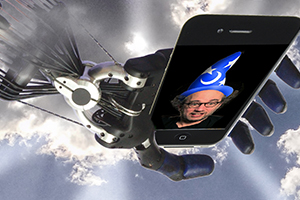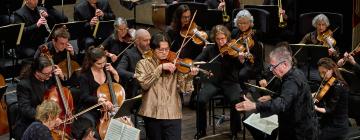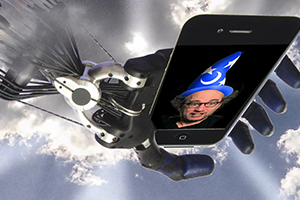
A true flash mob filled the San Francisco Conservatory Concert Hall during Tod Machover’s Sunday afternoon opera Death and the Powers. Patrons’ tablets and cell phones were on. Images simulcast from a live performance in Dallas flitted bluishly on faces across the capacity crowd. Sound equipment and a huge screen on stage completed the environment for wired folks and luddites alike while the opera’s protagonist, Simon Walter Powers, sung by a scary Robert Orth, urged everyone to abandon their bodies and be subsumed into his computer system. “Come to the light from the meat!” he begged. But after two hours, attendees abandoned the auditorium instead of their flesh. Too bad for Mr. Powers, but pretty good for Mr. Machover: Everyone I spoke with enjoyed the experience, even if its music failed to exploit Robert Pinsky’s culturally resonant libretto.
The plot concerns a powerful multibillionaire who escapes imminent death by somehow integrating his personality into an apparently computer-generated realm of hardware and software called “The System.” Simon Walter Powers is textually an amalgam of Simon Magus, the sorcerer in Acts 8:20 who “thought that the gift of God could be purchased with money”; Walt Disney and Walt Whitman, “immortals” specifically referred to in the libretto; and Powers, a name with all the letters necessary to spell Shakespeare’s Prospero, as well as reflect the Faustian goals Simon seeks. Powers’ daughter is of course named Miranda. His wife (for some unstated reason, his third) is Evvy, or Eve, resonating as an Adam and Eve pair ready to star in a new meatless Eden.
Once disembodied, Powers wreaks economic havoc on the planet (whether by plan or indifference is not made clear) because he “can still sign checks.” When leaders of the planet come to beg his help, he claims they interfere with his ascent to the light, quoting German poetry used in Mahler’s Resurrection symphony. The Systemic Simon says (note the kids’ game reference possibilities to the name) he’s bored with the leaders and only wants to transform his family members to his ethereal status. Evvy joins him, but Miranda refuses, preferring to cherish all bodily aspects of her self, including her “misery … painful as it is.” Whether Miranda prevails is not known, since the entire story above ends abruptly, enacted by robots as a ritual mysterious to them, a practice commanded to them from the “Organic Age.” Humanity has disappeared, presumably with very few individuals making it to Simon’s “light.”
Four Appealing Aspects

Even though there are so many old Sci-Fi tropes in this story about the immortality fetish, it’s pointless to wonder why the aggrieved world leaders didn’t just unplug the bastard, who was surviving on electric energy, and confiscate his cash. Rather, it’s more interesting to reflect on the more appealing aspects of the opera: the staging, the singing, the poetry, and the gimmicks.
The staging was a major source of sleep prevention. The pair of stage directors Diane Paulus and Andrew Eggert, working with production designer Alex McDowell, lighting designer Donald Holder, and sound designer Chris Full, did much to up the fascination with rotating banks of flashing lights and image pieces representing Powers as a System, with a hanging robotic claw that looked like a giant tea strainer, with a prosthetic arm for Powers’ assistant Nicholas (should’ve been named Igor), and nine roll-a-gig floor robots that looked like tilting triangular pizzas on six-poled pedestals.
The singing was another source of fascination. Orth was the embodiment and out-of-bodiment of a self-obsessed, pseudosympathetic monomaniac, with a powerful (or powerfully amplified) voice. Joélle Harvey had the best music as Miranda, and served it well, vocally and emotionally. Patricia Risely was an appropriately Hera-like Evvy. Hal Cazalet’s beautiful tenor brought dynamism to the role of Nicholas. A highlight of the production for me was the Ping, Pang, and Pong of the three officials fruitless begging help from Powers: countertenorish tenor Frank Kelley, Baritone David Kravitz, and bass Tom McNichols. The scherzo of their wheedling helped ground some of Powers' highfalutin philosophizing.
The central source of my interest in the opera was Robert Pinsky’s libretto. Lucidity, word play, rhythm, variety, thoughtfulness—all flashed by constantly like the lights of Powers’ System. Pinsky’s was a libretto meant to be appreciated immediately by its audience (unlike, for example, Alice Goodman’s fine but far more opaque one for John Adams’ Nixon in China). Pinsky’s words for Powers while he’s still embodied can stand for Machover’s goals for his own opera:
My business is making Being:
To build the towers, to cure
The disease, to make the hours
Amusing or improving
By showing you something new By taking you some where real
You never were before
Technology: A Fad or a Future?

Finally, the gimmicks. The presentation was billed as a world simulcast. Perhaps some felt a thrill thinking that folks in Stockholm, Paris, and London were seeing what they were seeing (eight other locations were in the U.S., three of them in California). That fact did nothing to enhance my experience; a delayed broadcast at a more reasonable hour may have been preferable to some. Billed as starting a noon, the simulcast actually started at 11:45 a.m. with an introduction by Machover. The audience ignored him and chatted him away to inaudibility. When a promo for the Dallas Opera came on next, on–stage dignitaries in the Conservatory hall did their introductions while Dallas was muted. During the performance, people who were able to WiFi in (some tried but failed) could download an app that played images additional to what was on the big screen. Some images could be prodded with fingers to produce lights and/or movement. Most attendees tired of these quickly. Only once did a significantly additive feature appear on the flash-mob’s machines: Powers' face, full of boredom and ridicule, accompanied the three World Figures’ plea for help. It was not on the big screen.
In an elaboration of this concept, I could see a counterflow of ideas similar to what Wagner does with his orchestral leitmotifs relative to what characters are saying. But even more so, today’s technologies could eventually customize such transmissions to fit the attitudes of listeners based on Facebook profiles. Thus, power-hungry types would receive heroic, Soviet-poster-like images of Powers, while anarchistic viewers would see Powers’ features twisted into those of a Niebelung.
But in summary, the linked-in features of the simulcast did nothing to enhance the meaning or value of the opera, except perhaps as an experiment for future improvement. I am reminded by an ill-fated attempt to channel program notes to listeners at an Oakland Symphony performance a few years ago. A great idea, but it takes lots of money, and the effort to reeducate basically conservative classical-music enthusiasts. Operas are expensive enough as it is to mount.
Finally, the music, something that should be the most important aspect of an opera. It’s not that Machover’s music was inappropriate, earsplitting, poorly orchestrated, or devoid of melody. It had lots of technologic bells and whistles that went with the opera’s Sci-Fi theme. The quality was modernistic, reflecting Machover’s studies with Eliot Carter and Pierre Boulez, but included tonal elements and showed consideration for the lyric possibilities of the voice. There were no tunes, but there were several expressive opportunities for soloists that helped carry forth the drama. But some of the past cultural references were so strong, I wanted the music to pay homage to them the same way the text was, through quotation or stylistic reference. I would have liked to hear a quote from Mahler’s Resurrection symphony. Perhaps something Schubertian to go along with the other German texts. Certainly a snippet from Dukas’ Sorcerer’s Apprentice would have done wonders for Nicolas’ lines. Yet in any case, a pointed hat-off to Technomaster Machover for an amusing two hours, and a terrific if unseen work in the pit by conductor Nicole Paiement.

